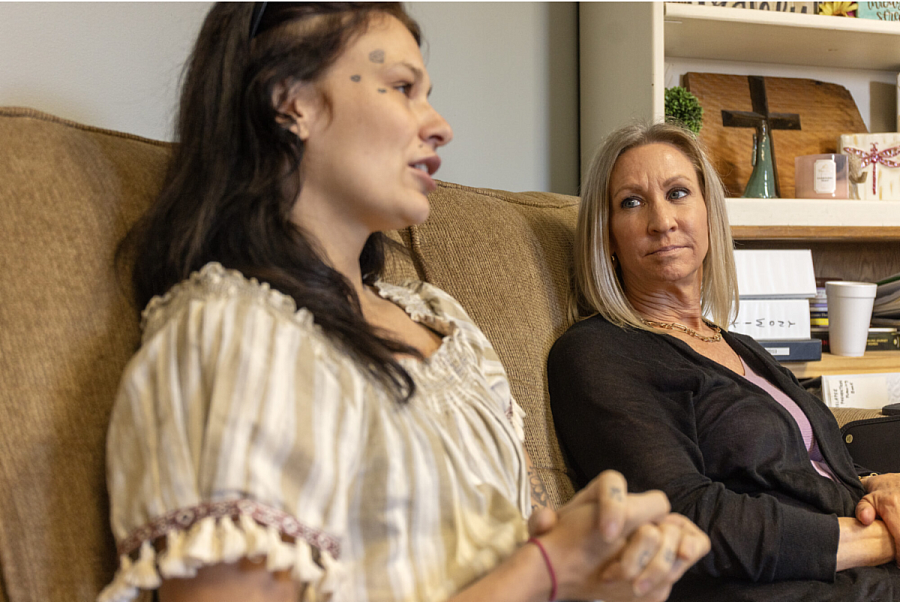The Health Divide: How one Mississippi newsroom is bringing home the story of federal health cuts
Image

Phaedre Cole, president of the Mississippi Association of Community Mental Health Centers, right, listens as Katiee Evans talks about her recovery at the Fairland Center in Dublin, Mississippi. Federal funding cuts pose real threats to mental health and addiction treatment programs in the state.
(Photo by Eric Shelton/Mississippi Today)
Published on
July 7, 2025
As drug overdose deaths decline after years of relentlessly rising, the federal government is gutting programs shown to save and stabilize lives.
There’s a barrage of news like this. Multibillion-dollar cuts to vital public health and mental health. Massive layoffs at federal agencies, including the Department of Health and Human Services. Lawsuits to restore funding and jobs, lower-court injunctions, appellate court decisions, Supreme Court ruings.
And that’s all before the president’s megabill takes effect and nearly 12 million Americans lose their health insurance over the next decade.
So many journalists I talk with are wrestling with how to follow such dramatic changes, let alone make sense of what it all means to their communities.
That’s why I was struck by this advice to journalists from Dr. Georges Benjamin, executive director of the American Public Health Association:
“In my view you’ll be more effective if you pick a small area so you can talk about impact,” he said on a recent Center for Health Journalism webinar. “So pick a topic. And follow the money. And follow the people.”
At Mississippi Today, mental health reporter Allen Siegler did just that after the federal government abruptly canceled more than $11 billion in grants that had already been awarded for addiction treatment and other mental and behavioral health initiatives across the country.
Twenty-three states sued the federal government in April. A court ruling kept the money flowing, but only to those states. Mississippi, like most states, didn’t sue and took the hit.
Siegler wrote about an addiction treatment center in the Delta that relied heavily on funding from the federal Substance Abuse and Mental Health Services Administration (SAMHSA), an agency within HHS. He focused on a program serving new mothers, telling the story of a woman who had lost custody of her first baby as she struggled with methamphetamine addiction.
With the treatment center’s help and the support of dozens of new parents who came through the program, she kicked her addiction. She went on to reunite with her child, have two more, and work at the center in administration.
What caught my attention about this story was the backdrop Siegler painted. He made it clear that amid the loss of funding, much more was at stake than addiction treatment, critical as that is.
Substance use, he wrote, is the second leading cause of pregnancy-related deaths in Mississippi, which has one of the highest maternal mortality rates in the U.S. and the highest rate of infant mortality.Nowhere in Mississippi do pregnant and postpartum women die more often than in the region where the treatment center is located.
And mental health care in the state, as in the country at large, is already stretched beyond reason.
A decade ago, the federal government sued Mississippi, claiming that too many people were involuntarily committed to hospitals because the state failed to provide enough mental health services in the community. Although the state won the case on appeal, officials pledged to prioritize community-based treatment.
“It signaled to us that community mental health clinics are doing really important work without a lot of resources,” Siegler told me. Clinic closures over the years have put tremendous pressure on those still standing, some just barely.
Every state has unique circumstances. But stories like this can be found all over the country.
I asked Siegler how he chose to approach this story. As it happened, it chose him — on his first day at the paper.
After SAMHSA announced on March 24 that it was terminating grants it had committed through September, Gwen Dilworth, who covers community health at the paper, filed a Freedom of Information Act request with the state Department of Mental Health. She asked for emails to and from the executive director from March 24 to March 28 containing the words “cuts,” “grant” and “grants.” Dilworth forwarded the 283-page records response to Siegler as soon as he joined the paper and its health team in late April.
Siegler, who was a 2023 grantee of the Center for Health Journalism’s Impact Fund for Reporting on Health Equity and Health Systems, read through the emails. He noticed the contrast between the public statements of officials and their private comments.
“We saw that there was a lot of chaos,” he said. “Nobody knew what was going on.”
He reached out to treatment programs identified in the FOIA trove and focused on the one he did because of its work with pregnant clients and new parents. Given the state’s maternal health crisis, he said, “everyone on the health team understood that it was a really essential program.”
He reached out to treatment programs identified in the FOIA trove and focused on the one he did because of its work with pregnant clients and new parents. Given the state’s maternal health crisis, he said, “everyone on the health team understood that it was a really essential program.”
Image

Mississippi Today mental health reporter Allen Siegler interviews a provider at Delta Health Center in Mound Bayou, Mississippi, in May.
(Photo by Eric Shelton/Mississippi Today)
His story quotes two state lawmakers, a Republican and a Democrat, bemoaning the loss of the funds. Yet when he asked the state attorney general’s chief of staff why Mississippi hadn’t joined the lawsuit to recoup the money, she said she didn’t know which lawsuit he was referring to.
In a follow-up story, a Department of Mental Health spokesperson said the rescinded funds — $7.5 million — were set to expire in September and there was no guarantee the recipients would have spent all the money by then.
That may or may not be true. In any case, the federal cuts for addiction services, and mental health care more generally, will go far beyond this single funding stream. The administration is dismantling SAMHSA, which not only has led federal efforts to improve the lives of people struggling with addiction and mental illness, but also has been instrumental in developing the 988 mental health crisis line and promoting the widespread use of the overdose-reversal medication naloxone, or Narcan.
Federal action on mental health will be subsumed by a new bureaucracy organized by Health Secretary Robert F. Kennedy Jr. under the banner of Make America Healthy Again. It’s not clear what will become of SAMHSA initiatives, which have been widely credited for the recent, unprecedented reduction in fatal overdoses.
And while that decline is great news, overdose remains the leading cause of death for Americans ages 18-44. The crisis is far from over.
With historic cuts targeting Medicaid and other health programs, Siegler and his colleagues on the health team will have plenty to write about. In Mississippi, Medicaid now covers 57% of births, 48% of children and 75% of nursing home residents. Cuts to the program — through a decrease in Medicaid provider taxes or the bureaucratic hurdles of work requirements — will cause tremendous pain to people in every corner of the country.
As journalists cover these stories, Siegler believes they need to let in some of that pain.
“I think that makes reporting better in general, if you could really put yourself in people's shoes and imagine how you you'd feel if your brother, your sister, your mom, your dad, weren't able to get the health services that they need,” he said.

